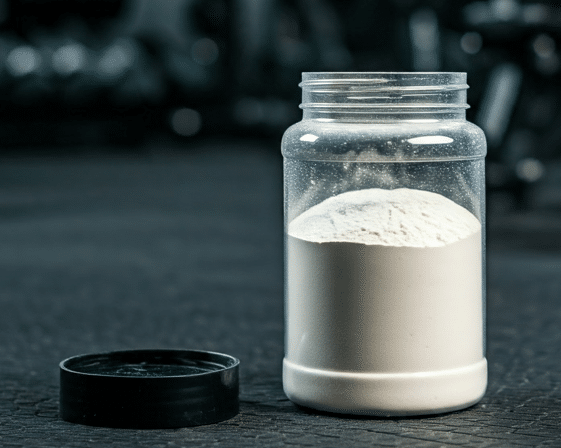L-Arginine: The Key to Boosting Blood Flow and Enhancing Performance
L-Arginine is a popular supplement known for its role in promoting healthy blood flow, improving athletic performance, and supporting heart health. You may have come across L-Arginine in pre-workout formulas or as a stand-alone supplement, but what exactly is it, and how does it work? In this blog, we’ll break down everything you need to know about L-Arginine, its benefits, how to take it, and why it’s gaining popularity in both the fitness and wellness communities.
What is L-Arginine?
L-Arginine is a semi-essential amino acid, meaning your body can produce it, but under certain conditions, you may need more than your body makes. It plays a critical role in producing proteins, but its main claim to fame is its role in producing nitric oxide. Nitric oxide is a molecule that helps relax blood vessels, improving circulation and allowing more oxygen and nutrients to reach your muscles during exercise.
Since nitric oxide plays such a significant role in maintaining good blood flow, L-Arginine is often used as a supplement to support cardiovascular health, boost exercise performance, and even enhance sexual health.
How Does L-Arginine Work?
L-Arginine works by converting into nitric oxide in the body. Nitric oxide, in turn, dilates blood vessels through a process known as vasodilation. This widening of blood vessels improves blood circulation, ensuring that your muscles get more oxygen and nutrients, which can enhance endurance, strength, and recovery.
By increasing nitric oxide production, L-Arginine also helps reduce blood pressure and improve heart function. The better blood flow helps your body perform optimally, whether you’re lifting weights, running, or engaging in other high-intensity activities.
Benefits of L-Arginine
Improved Blood Flow and Circulation
The most well-known benefit of L-Arginine is its ability to improve blood flow by increasing nitric oxide levels. This improved circulation can enhance workout performance, helping you push through intense exercise with greater ease. Enhanced blood flow also benefits recovery, as more oxygen and nutrients are delivered to muscle tissues.
Enhanced Athletic Performance
Athletes and fitness enthusiasts often use L-Arginine as part of their supplement regimen to improve endurance, strength, and stamina. By increasing nitric oxide production, L-Arginine helps delay muscle fatigue, allowing you to exercise for longer without feeling as tired. Many pre-workout supplements contain L-Arginine for this very reason—it helps fuel your workouts by improving blood flow and nutrient delivery to muscles.
Supports Heart Health
L-Arginine has been extensively studied for its role in supporting cardiovascular health. By promoting better blood flow and reducing blood pressure, it can help improve overall heart function. For people with high blood pressure or certain heart conditions, L-Arginine supplementation can support better circulation and vascular health.
Boosts Immune Function
L-Arginine also plays a role in supporting immune function. As an amino acid, it helps produce proteins that are crucial for immune cell production and response. Improved circulation from nitric oxide production may also help enhance immune system function by improving the delivery of immune cells throughout the body.
Enhanced Sexual Health
Because L-Arginine improves blood flow, it is often used as a natural remedy for erectile dysfunction (ED). Increased nitric oxide levels help relax blood vessels, promoting better blood flow to the reproductive organs, which can support sexual health in men. Some studies also suggest that L-Arginine can improve sexual function in women by increasing blood flow to the pelvic area.
Improved Wound Healing
L-Arginine can also help speed up the healing process for injuries and wounds. Nitric oxide plays an important role in wound healing by enhancing blood flow to damaged tissues, promoting faster recovery.
Foods Rich in L-Arginine
Although L-Arginine is available in supplement form, you can also find it naturally in certain foods. Some of the best food sources of L-Arginine include:
- Meat and Poultry: Turkey, chicken, and beef are rich in L-Arginine.
- Fish: Tuna, salmon, and mackerel are excellent sources of this amino acid.
- Dairy Products: Milk, cheese, and yogurt contain L-Arginine.
- Nuts and Seeds: Pumpkin seeds, sesame seeds, and peanuts are good plant-based sources.
- Legumes: Lentils, chickpeas, and soybeans are rich in L-Arginine.
- Whole Grains: Oats and brown rice also contain this amino acid.
L-Arginine Dosage and How to Take It
The dosage of L-Arginine depends on your goals, whether it’s improving athletic performance, supporting heart health, or enhancing sexual function. Here’s a general guide to how much you might need:
For Athletic Performance
To boost athletic performance, a common dosage is between 3 and 6 grams of L-Arginine, taken 30–60 minutes before your workout. This timing allows your body to produce more nitric oxide in time for exercise, leading to improved blood flow and better endurance.
For Heart Health
People taking L-Arginine for cardiovascular benefits often use smaller doses, around 2–3 grams per day, either as a single dose or divided into two. Regular use helps maintain healthy blood pressure and improve circulation.
For Sexual Health
For those taking L-Arginine to enhance sexual function or address erectile dysfunction, studies suggest doses ranging from 3 to 5 grams per day. This helps boost nitric oxide production, which improves blood flow to the reproductive organs.
L-Arginine Stacks
L-Arginine is often combined with other supplements like L-Citrulline, creatine, or beta-alanine to enhance performance. Citrulline, in particular, is commonly paired with L-Arginine since it converts into Arginine in the body and can help increase its effectiveness.
L-Arginine Side Effects and Safety
L-Arginine is generally safe for most people when taken in appropriate doses. However, taking too much can lead to some mild side effects, such as gastrointestinal discomfort, bloating, or diarrhea. To avoid this, it’s best to start with a lower dose and gradually increase it based on how your body responds.
People with low blood pressure or certain heart conditions should consult their healthcare provider before taking L-Arginine, as it may interact with medications or exacerbate existing conditions.
L-Arginine Myths and Misconceptions
Like many supplements, L-Arginine has its share of myths and misconceptions. Let’s address a few:
- Myth: L-Arginine is a stimulant.
L-Arginine is not a stimulant like caffeine. It works by improving blood flow and circulation, which can indirectly enhance energy and endurance, but it doesn’t give you the same quick energy boost as stimulants do. - Myth: L-Arginine only benefits men.
While L-Arginine is often marketed for male sexual health, it offers benefits for both men and women. Its ability to improve circulation can enhance athletic performance, support heart health, and even promote sexual health for women by improving blood flow to the reproductive organs. - Myth: L-Arginine works instantly.
While L-Arginine can have some immediate effects, especially for athletic performance, its long-term benefits, such as cardiovascular health improvements, are best achieved through consistent use over time.
Conclusion
L-Arginine is a versatile amino acid that offers a range of benefits for both athletes and everyday individuals. From improving workout performance to supporting heart health and enhancing sexual function, L-Arginine is a powerful supplement that can help you achieve your fitness and health goals. Whether you get it through supplements or naturally from your diet, incorporating L-Arginine can have lasting positive effects on your overall well-being.
If you’re looking for a safe and effective way to improve blood flow, boost your endurance, and support your heart, L-Arginine is a great addition to your supplement stack. Just be sure to follow the recommended dosages and consult your healthcare provider if you have any pre-existing conditions or concerns.



One Reply to “L-Arginine”
Comments are closed.